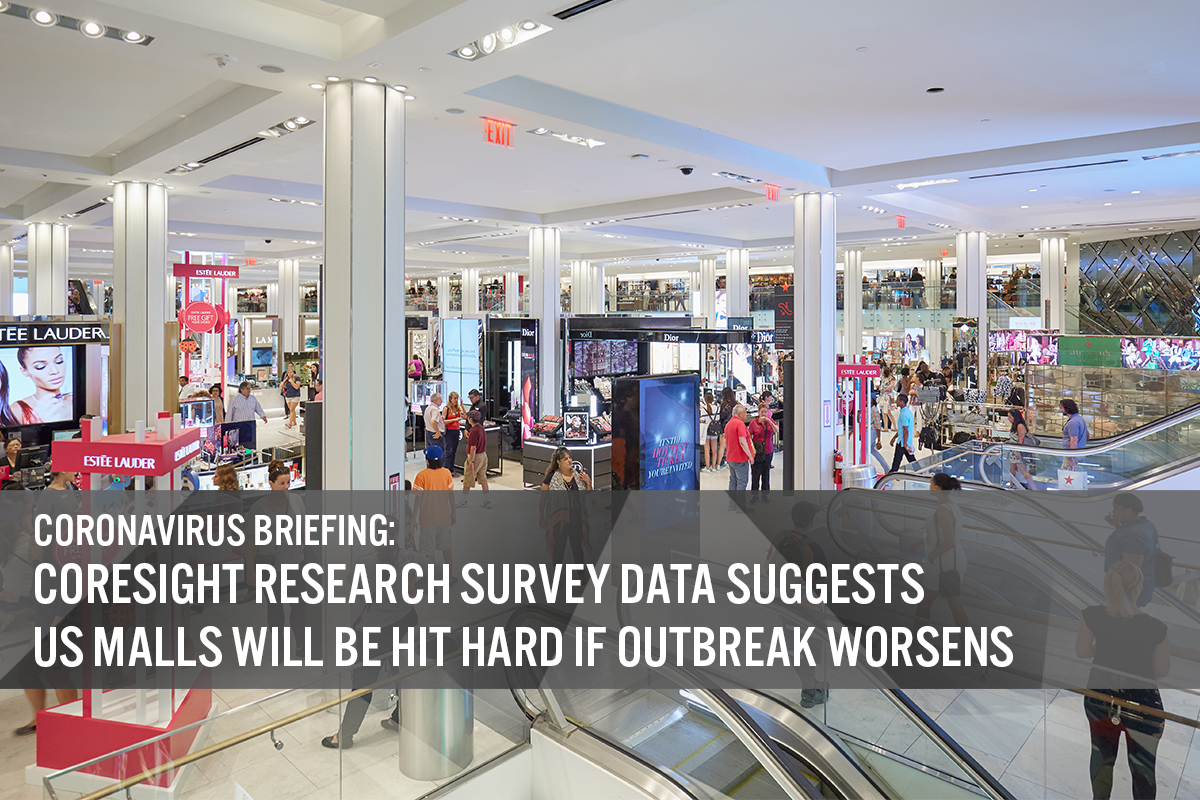
Nitheesh NH
Continuing our Coronavirus Briefing series, we review the results of a recent Coresight Research proprietary survey of US consumers on the current and potential impact of the outbreak on behavior, including visits to stores and shopping centers.
Our survey was undertaken among US consumers aged 18 and above on February 25–26, 2020. We asked respondents if they are avoiding public areas or limiting visits to public areas (such as shopping centers, entertainment venues or workplaces) or changing travel arrangements in response to the outbreak; and, we asked which locations or travel they are steering clear of or may avoid in future.
Over One-Quarter Say They Already Avoid Public Areas: Over One-Half Will Do So if the Outbreak Worsens
Over one-quarter (27.5%) of respondents say the coronavirus outbreak is prompting them to avoid or limit visits to public areas or change travel arrangements. When we asked if they are likely to avoid areas or travel if the outbreak worsens in the US, the number of respondents jumped to well over half (58.0%), with a further one-fifth not sure.
[caption id="attachment_104366" align="aligncenter" width="700"]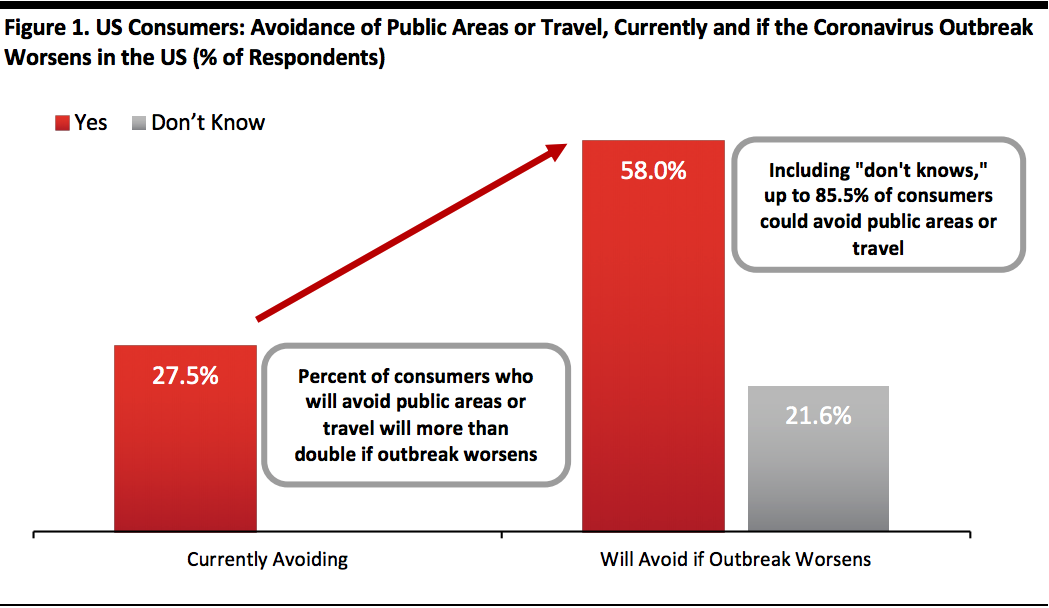 Base: 1,934 US Internet users aged 18 and above, surveyed in February 2020
Base: 1,934 US Internet users aged 18 and above, surveyed in February 2020
Source: Coresight Research[/caption] Shopping Centers Are the Third-Most-Avoided Type of Location We asked those currently avoiding or expecting to avoid areas or travel what types of locations or travel they would avoid, and show the results below. The findings suggest malls are already among the most-avoided areas and are likely to be disproportionately hit if the outbreak worsens.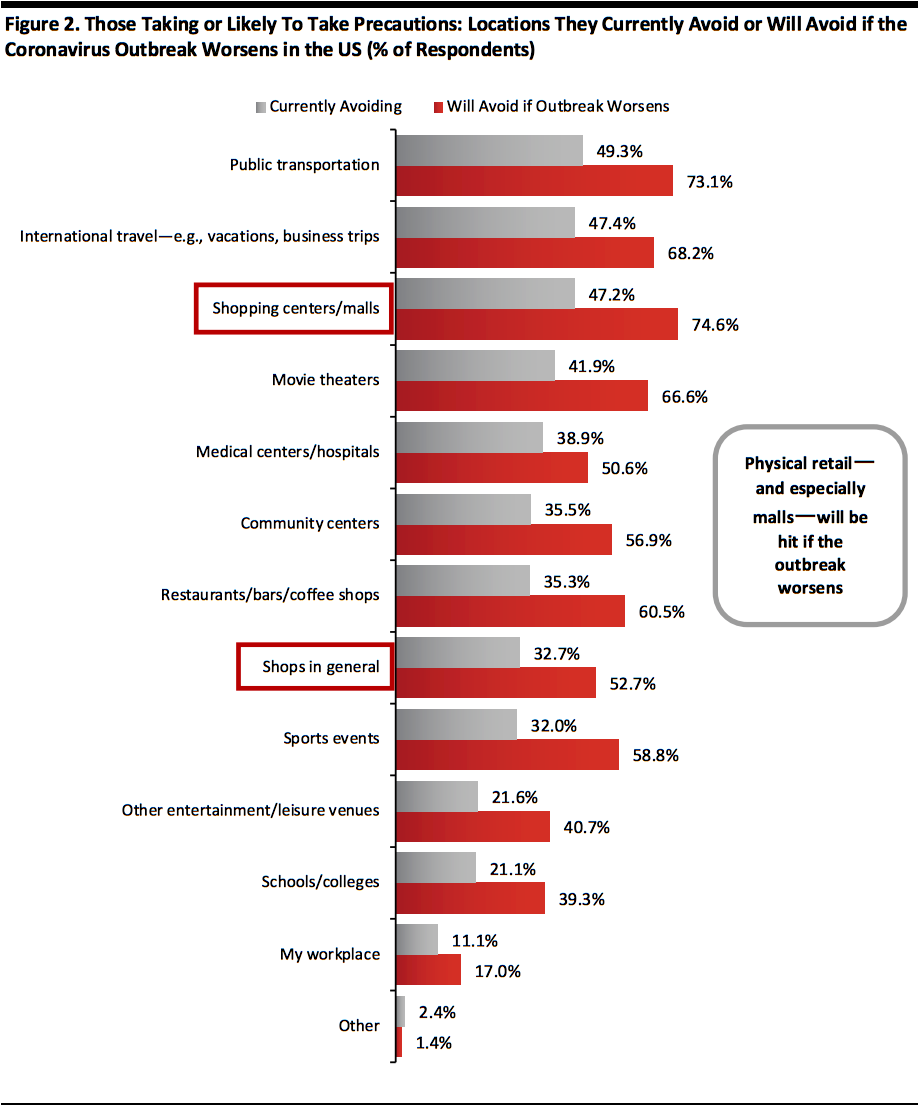 Base: US Internet users aged 18 and above, surveyed in February 2020: 532 who are currently avoiding public areas or travel, and 1,121 who are likely to avoid public areas or travel if the coronavirus outbreak worsens
Base: US Internet users aged 18 and above, surveyed in February 2020: 532 who are currently avoiding public areas or travel, and 1,121 who are likely to avoid public areas or travel if the coronavirus outbreak worsens
Source: Coresight Research[/caption] Older Shoppers Are More Likely To Avoid Retail Current avoidance of public areas or travel overall peaks at 31% among the 30–44 age group, versus the 27.5% average, although the differences by age are not substantial. However, among those currently taking precautions, older consumers are much more likely than their younger counterparts to avoid retail formats: Over half of “avoiders” aged over 60 say they already avoid shopping centers/malls, compared to slightly more than one-third of “avoiders” aged 18–29. This may prove some consolation to many brick-and-mortar retailers, who will be more reliant on big-basket, family-lifestage shoppers (such as in grocery and essentials) or freer-spending younger consumers (such as in fashion). [caption id="attachment_104368" align="aligncenter" width="700"]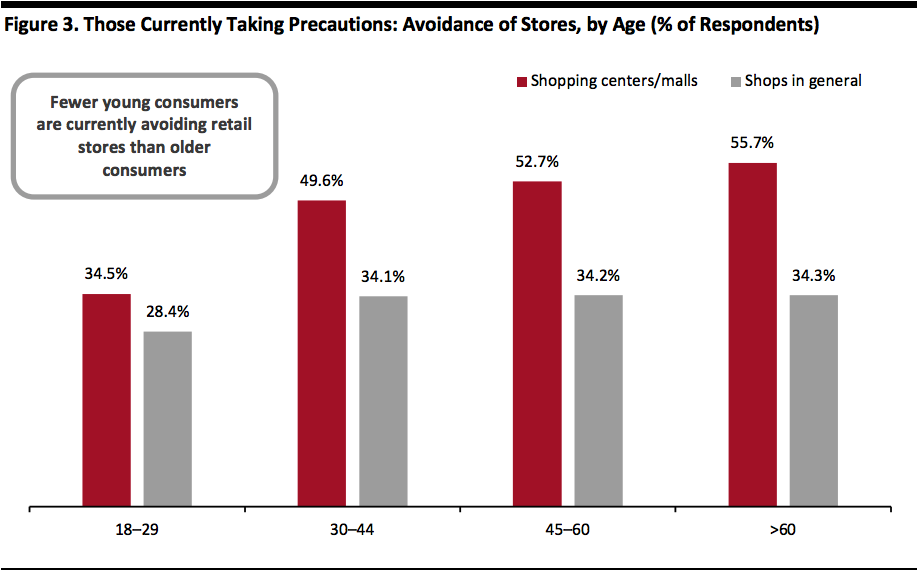 Base: 532 US Internet users aged 18 and above who currently avoid public areas or travel, surveyed in February 2020
Base: 532 US Internet users aged 18 and above who currently avoid public areas or travel, surveyed in February 2020
Source: Coresight Research[/caption] This age difference remains when we ask about likely future behavior should the outbreak worsen: We continue to see older consumers more likely than younger shoppers to restrict store trips. [caption id="attachment_104369" align="aligncenter" width="700"]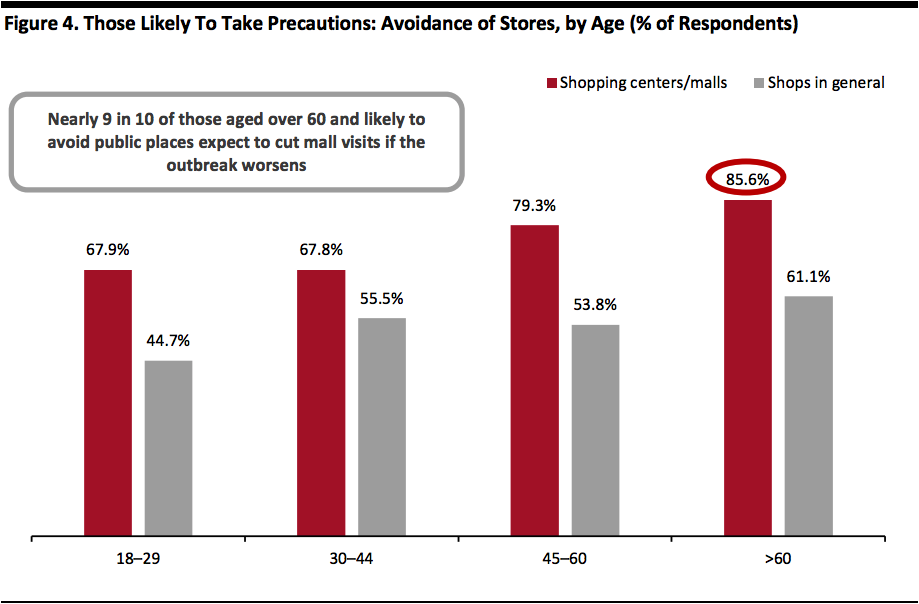 Base: 1,121 US Internet users aged 18 and above who are likely to avoid public areas or travel if the coronavirus outbreak worsens in the US, surveyed in February 2020
Base: 1,121 US Internet users aged 18 and above who are likely to avoid public areas or travel if the coronavirus outbreak worsens in the US, surveyed in February 2020
Source: Coresight Research[/caption] What We Asked We asked respondents: Are you currently avoiding public areas/limiting your visits to public areas (such as shopping centers, entertainment venues, workplaces, etc.) or changing your travel arrangements in response to the coronavirus outbreak? If the coronavirus outbreak worsens in the US, are you likely to avoid public areas/limit your visits to public areas (such as shopping centers, entertainment venues, workplaces, etc.) or change your travel arrangements in response? We asked those answering “yes” to each question which types of locations or travel they are avoiding or likely to avoid.
 Base: 1,934 US Internet users aged 18 and above, surveyed in February 2020
Base: 1,934 US Internet users aged 18 and above, surveyed in February 2020Source: Coresight Research[/caption] Shopping Centers Are the Third-Most-Avoided Type of Location We asked those currently avoiding or expecting to avoid areas or travel what types of locations or travel they would avoid, and show the results below. The findings suggest malls are already among the most-avoided areas and are likely to be disproportionately hit if the outbreak worsens.
- Among those currently changing behavior, shopping centers/malls are narrowly the third-most-avoided type of location, trailing public transportation and fractionally behind international travel. More than four in 10 respondents say they are already avoiding or limiting visits to malls.
- Shops in general rank significantly lower on current avoidance than shopping centers/malls, reflecting the essential nature of shopping for categories such as groceries, which are typically bought away from malls.
- Among those likely to take action if the outbreak worsens, shopping centers/malls jump to first place, with around three-quarters expecting to avoid or limit their visits to these types of location.
- On future expectations, shops in general again rank lower than malls, although over half of avoiders could steer clear of, or reduce their visits to, retail stores.
 Base: US Internet users aged 18 and above, surveyed in February 2020: 532 who are currently avoiding public areas or travel, and 1,121 who are likely to avoid public areas or travel if the coronavirus outbreak worsens
Base: US Internet users aged 18 and above, surveyed in February 2020: 532 who are currently avoiding public areas or travel, and 1,121 who are likely to avoid public areas or travel if the coronavirus outbreak worsensSource: Coresight Research[/caption] Older Shoppers Are More Likely To Avoid Retail Current avoidance of public areas or travel overall peaks at 31% among the 30–44 age group, versus the 27.5% average, although the differences by age are not substantial. However, among those currently taking precautions, older consumers are much more likely than their younger counterparts to avoid retail formats: Over half of “avoiders” aged over 60 say they already avoid shopping centers/malls, compared to slightly more than one-third of “avoiders” aged 18–29. This may prove some consolation to many brick-and-mortar retailers, who will be more reliant on big-basket, family-lifestage shoppers (such as in grocery and essentials) or freer-spending younger consumers (such as in fashion). [caption id="attachment_104368" align="aligncenter" width="700"]
 Base: 532 US Internet users aged 18 and above who currently avoid public areas or travel, surveyed in February 2020
Base: 532 US Internet users aged 18 and above who currently avoid public areas or travel, surveyed in February 2020Source: Coresight Research[/caption] This age difference remains when we ask about likely future behavior should the outbreak worsen: We continue to see older consumers more likely than younger shoppers to restrict store trips. [caption id="attachment_104369" align="aligncenter" width="700"]
 Base: 1,121 US Internet users aged 18 and above who are likely to avoid public areas or travel if the coronavirus outbreak worsens in the US, surveyed in February 2020
Base: 1,121 US Internet users aged 18 and above who are likely to avoid public areas or travel if the coronavirus outbreak worsens in the US, surveyed in February 2020Source: Coresight Research[/caption] What We Asked We asked respondents: Are you currently avoiding public areas/limiting your visits to public areas (such as shopping centers, entertainment venues, workplaces, etc.) or changing your travel arrangements in response to the coronavirus outbreak? If the coronavirus outbreak worsens in the US, are you likely to avoid public areas/limit your visits to public areas (such as shopping centers, entertainment venues, workplaces, etc.) or change your travel arrangements in response? We asked those answering “yes” to each question which types of locations or travel they are avoiding or likely to avoid.